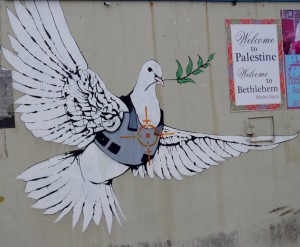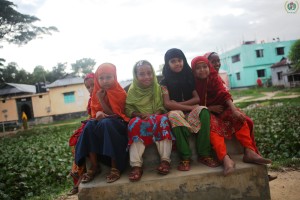
Graffiti art by Banksy on the dividing wall between Israel and the Palestinian Territories
Over the past month in Israel, violence has been ratcheting up towards the possibility of all-out war. I’ve noticed that Christian friends on social media have begun voicing support for Israel, or commenting on the inherent violence of Muslims. In bewildering circumstances like these, it’s easy to cling to simplistic ideas of good versus evil, typecasting individuals and societies as villains and victims. But until we deal with our unconscious biases and ignorance, we will not be able to see clearly what is happening, and we will not be able to respond effectively. A wise and faithful response to the crisis requires us to educate ourselves about the history and wider context of the conflict. As American Christians, what assumptions or beliefs may be obscuring our view?
We Equate Modern Israel with Biblical Israel
In Genesis chapter 12, God tells Abraham, “I will bless those who bless you, and curse those who curse you,” which many Christians interpret to mean that believers have a responsibility to offer unconditional political support the modern nation-state of Israel. This is an inaccurate assumption because in reality, there are important differences between the twelve tribes mentioned in the Old Testament and the nation-state of Israel. Ancient Israel was a theocracy, governed by priests based on direct revelation from God; modern Israel is a secular democracy, established through the actions of the British colonial government and the United Nations in the 1940s. Furthermore, the nation of Israel is not synonymous with the Jewish people. Not only is there a global community of Jews who have lived outside of Palestine for thousands of years, but within the nation itself, 20% of the Israeli population is Arab, and Arab Christians and Muslims across the Middle East also trace their ancestry back to Abraham.
The belief that Christians are commanded to “bless” modern Israel tends to imply a divine stamp of approval for particular Israeli policies or military actions. But instead of unconditionally supporting Israel or any other nation, we as Christians should be evaluating a government’s laws and actions through the lens of the Kingdom Jesus taught: do they result in freedom for the oppressed, or protection for the vulnerable? Do they result in the naked being clothed, the hungry being fed, and the homeless housed? Or do they result in the opposite?
We Misunderstand the Abrahamic Covenant
The Abrahamic Covenant is God’s promise to guide and protect Abraham and his descendants, and to give them the land of Canaan; they are commanded to be circumcised as a sign of faithfulness to this covenant (Gen. 15, 17). God not only promises Abraham that his descendants will become “a great nation,” but declares that “all peoples on earth will be blessed by you” (Genesis 12:3). So, the Jewish people are chosen not as a special ethnic group who are more important to God than all other people, but as a conduit of blessing for the whole world. In the Old Testament, non-Jews like Ruth and Rahab join the covenant community through faithful action, and Jesus mentions Gentiles who were cared for or healed by God even when Israel was in distress (Luke 4:25-27).
Jesus fulfills this promise by widening the covenant to include not only people of Jewish descent, but anyone and everyone who joins the family of God through faith. As the apostle Paul writes in Ephesians 2, Jesus has made Jews and Gentiles “one and has destroyed the barrier, the dividing wall of hostility, by abolishing in his flesh the law with its commandments and regulations.” Paul goes on to say in Ephesians 3:6 that “through the gospel the Gentiles are heirs together with Israel, members together of one body, and sharers together in the promise in Christ Jesus.” God’s loving plan for the whole world has been revealed in Jesus.
We Ignore the Occupation
Israel invaded Gaza and the West Bank during the Six Day War in 1967, and continues to occupy these territories today. Having their homes demolished, losing their land, facing mass incarceration without trial, and denied equal protection under the law, many Palestinians are losing hope of things ever changing. Gaza’s 1.8 million residents live in poverty, unable to access adequate food or safe drinking water, experiencing 40% unemployment; in the West Bank, Palestinians’ water supply is often cut off or destroyed by Israeli settlers. Crossing into Israel for work, Palestinians spend hours each day waiting at security checkpoints, and in emergencies, this restricted movement sometimes means that people die before they can reach a hospital. Palestinian Christians have voiced their belief that conflict will not end until the occupation ends, and they are calling on the international Christian community to hold the State of Israel accountable for its illegal occupation of Palestinian territory.
The occupation creates an unequal society in which Israelis hold the vast majority of power, wealth, and land, and in which their safety and well-being is maintained at the expense of the safety and well-being of Palestinians. The segregated inequality in which the two groups live generates the fear, resentment, and hatred that breed violence in the first place, and the occupation is a barrier to peace because it depends upon exclusion and violence for its very existence.
We Forget about the Church’s Mission of Reconciliation
Jesus says, “Blessed are the peacemakers, for they are called children of God,” and the apostle Paul makes clear that a large part of the Church’s mission in the world is reconciliation. Forgiveness, enemy love, and creative nonviolence are all things that Jesus modeled and taught, and throughout history there are numerous examples of this kind of “Kingdom living” bringing peace and healing in situations of conflict. God is the source of true peace, but He brings peace into the world by working in and through human beings.
Working for peace does not mean being neutral, but it does mean that we move past tribal alliances with the people who are most like us. Peacemaking means that we stand on the side of compassion, of life, and of justice, no matter whose government or ideology we find ourselves standing against.
The truth is that the only way for either Israelis or Palestinians to achieve the freedom and safety they want is for them to recognize the humanity in each other, to understand that their well-being is tied together, and to work towards a future in which all are respected and included, regardless of their religion or ethnicity.
The New Testament makes clear that our allegiance as Christians is not to any earthly government or ethnic group, but to God and his Kingdom (Matt. 6:24, Acts 5:29). So, I don’t stand with Israel. Neither do I stand with Palestine. I stand with every human being who is angry and afraid, and I stand against the occupation which blocks their shared future.


